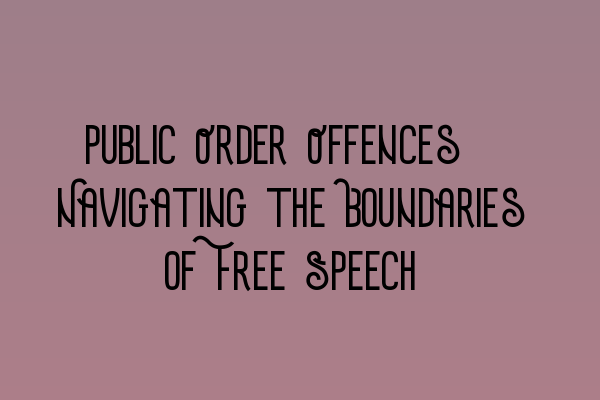Public Order Offences: Navigating the Boundaries of Free Speech
Welcome to another insightful article by SQE Criminal Law & Practice Law UK. In today’s blog post, we will discuss the complexities surrounding public order offences and the delicate balance between exercising free speech and respecting legal boundaries. Understanding the nuances of public order offences is essential for both legal professionals and individuals alike.
Public order offences encompass a wide range of behaviors that may disrupt or cause disorder in public spaces. These offenses include but are not limited to riot, violent disorder, affray, and disorderly conduct. The legal framework surrounding public order offences is designed to maintain public safety while safeguarding the fundamental right to freedom of expression.
The Boundaries of Free Speech
Free speech is a cornerstone of any democratic society. It allows individuals to express their opinions and ideas without fear of government censorship. However, this freedom is not absolute and can be limited to protect other fundamental rights and societal interests. This is where the legality of public order offences comes into play.
In the context of public order offences, the line between protected free speech and criminal behavior can often be blurred. It is crucial to ensure that your actions or speech do not incite violence, hatred, or harm to others. While individuals have the right to hold and express differing opinions, it is vital to exercise this right responsibly and within the confines of the law.
Understanding the specific elements that constitute public order offenses is paramount. For example, riot requires the involvement of three or more persons committing violent or disorderly acts with a common intent. On the other hand, affray involves the display of threatening behavior that causes others to fear for their safety.
By familiarizing yourself with these definitions and legal principles, you can better navigate the boundaries of free speech and avoid inadvertently crossing into criminal territory.
Legal Consequences and Penalties
Public order offences can carry severe legal consequences. Convictions can result in fines, community service orders, or, in some cases, imprisonment. It is essential to consult with qualified legal professionals who specialize in criminal law to ensure your rights are protected and to mount an appropriate defense if you find yourself facing such charges.
At SQE Criminal Law & Practice Law UK, we provide comprehensive legal services to individuals and businesses facing public order offenses. Our team of highly skilled solicitors has in-depth knowledge and expertise in criminal law, including public order offenses. We understand the complexities of defending these cases and work tirelessly to achieve the best possible outcomes for our clients.
If you would like to learn more about public order offenses or require legal representation, please get in touch with our expert team. We offer SQE 1 and SQE 2 preparation courses and provide invaluable resources such as SQE 1 practice exam questions and practice mocks. Stay updated with the SRA SQE exam dates to plan your preparations effectively.
